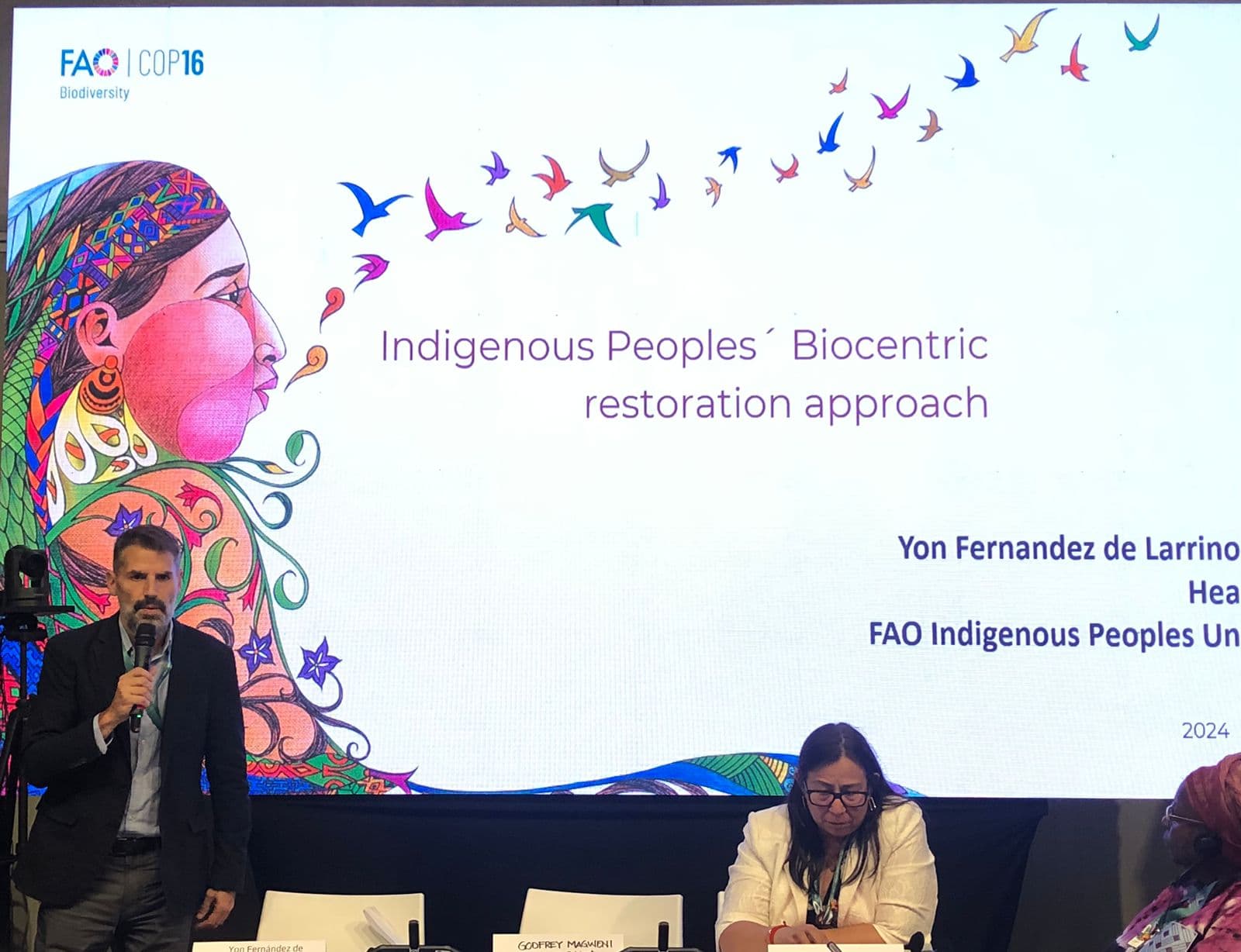
- This event has passed.
FAO Side Event at COP-16: Indigenous Peoples contributions to the Kunming-Montreal Global Biodiversity Framework

FAO Side Event at COP-16: Indigenous Peoples contributions to the Kunming-Montreal Global Biodiversity Framework
DATE & TIME: 22 October, 2024.
TIME: 1:20 PM COT
VENUE: Marie Khan Women’s Caucus meeting room, Plaza One
The IIFB will participate of this side event as FAO´s partner. This side event aims to:
1-Analyse the importance of the Indigenous Peoples’ biocentric restoration approach as an Indigenous Peoples-led process based on their cosmogony, spiritual beliefs, food and knowledge systems and territorial management practices and their contributions to address climate change and biodiversity loss.
2-Explain the potentialities of a Costa Rican National Plan on Indigenous Peoples’ biocentric restoration as a contribution in the achievement of target 2, 3 and 22 of the Kunming Montreal Global Biodiversity Framework.
3-Explain the works for a Regional Plan on Indigenous Peoples’ biocentric restoration for the South Andean Region at the local level in Peru and Bolivia as a contribution in the achievement of target 2, 3 and 22 of the Kunming Montreal Global Biodiversity Framework.
4-Detail the relevance of the Indigenous Peoples’ biocentric restoration approach to support the implementation of target 3 on Indigenous territories as a third category of management, and target 2 according to the UN Decade on Ecosystem Restoration, while recognizing the role of Indigenous Peoples’ knowledge. Show the benefits of the Indigenous Peoples’ biocentric restoration approach, crafted by FAO and Indigenous Peoples representatives, and the potentialities of the National Plan on Indigenous Peoples’ Biocentric Restoration of Costa Rica to restore degraded ecosystems and recognize the role of Indigenous Peoples’ food and knowledge systems in addressing biodiversity loss and climate change to achieve targets 2, 3 and 22 of the KMGBF. As well as, describing the potentialities of a Regional Plan for the High lands in the Andean in countries such as Peru and Bolivia.
The vital role that Indigenous Peoples play in addressing the climate, ecological and biodiversity crises has been increasingly recognized on the global stage. Policy discussions at the recent Conferences of the Parties (COPs) on climate and biodiversity, the UN Convention to Combat Desertification (UNCCD) and its Intergovernmental Working Group (IWG) on Drought, Intergovernmental Panel on Biodiversity and Ecosystem Services (IPBES), Intergovernmental Panel on Climate Change (IPCC), as well as at the 2021 UN Food Systems Summit, acknowledged that Indigenous Peoples’ territorial management, food, knowledge and governance systems are vital to climate regulation, biodiversity conservation, ecological restoration and the future of sustainable food systems.
This high-level side event, will delve in the potentialities of the Indigenous Peoples’ biocentric restoration approach, co-developed by Indigenous Peoples’ researchers and the FAO Indigenous Peoples Unit, to present an alternative way to restore degraded lands that emanate from Indigenous Peoples’ worldviews and knowledge. Led by Indigenous Peoples themselves, biocentric restoration centers Indigenous Peoples’ knowledge and cosmogonies and allows the community to restore their territories in ways that are rooted in ancestral beliefs, knowledge, and practices. “Biocentrism” broadly refers to the belief that all living things within an ecosystem have intrinsic and equal value.
The Indigenous Peoples’ biocentric restoration initiative also seeks to revive and promote ancestral knowledge and practices associated with territories and natural resource management. In doing so, the initiative seeks to “restore the forgotten memory of the territory”, enabling both natural and knowledge ecosystems to thrive and co-exist again. The session will elaborate on the design and launch of different biocentric restoration plans are underway, aligned with the targets of the Kunming-Montreal Global Biodiversity Framework, in particular target 2, target 3, target 22 and target 23, and the pillars of the UN Decade on Ecosystem Restoration.
This side event is organized by the Ministry of Environment of Costa Rica/ National System of Conservation Areas-SINAC, Mesa Nacional Indigena de Costa Rica and the FAO, with the support of partners such as the International Indigenous Forum on Biodiversity (IIFB), GIZ and REDD+, which are developing a participatory National Plan on Indigenous Peoples’ Biocentric Restoration, to support the implementation of the Costa Rican Restoration National Strategy, the PAFTs (Territorial Forest Environmental Plans) and the achievement of the CBD commitments.
The Plan is expected to include the 24 Indigenous territories of Costa Rica in a participatory way, respecting Indigenous Peoples’ rights and highlighting their contributions to halt biodiversity loss. Peru is planning a regional plan on Indigenous Peoples’ biocentric restoration in the Andean (Cusco, Puno, Arequipa and Moquegua) and the Titicaca Lake, to support the implementation of target 2 and 3 of the Kunming-Montreal Global Biodiversity Framework, led by Indigenous-based communities, local governments and Servicio Forestal Nacional de Peru (SERFOR).
The session will include good practices and lesson learned from the different projects on Indigenous Peoples’ biocentric restoration developed worldwide. Specific experiences from the projects in Peru (Andean highlands in Colca Valley), Brazil (Caatinga Biome), and Ecuador (Amazon basin) will be analyzed. The Indigenous Peoples’ biocentric restoration approach aims to support the implementation of the KMGBF target 3 on Indigenous Territories as a third category of management.
Photo Gallery








